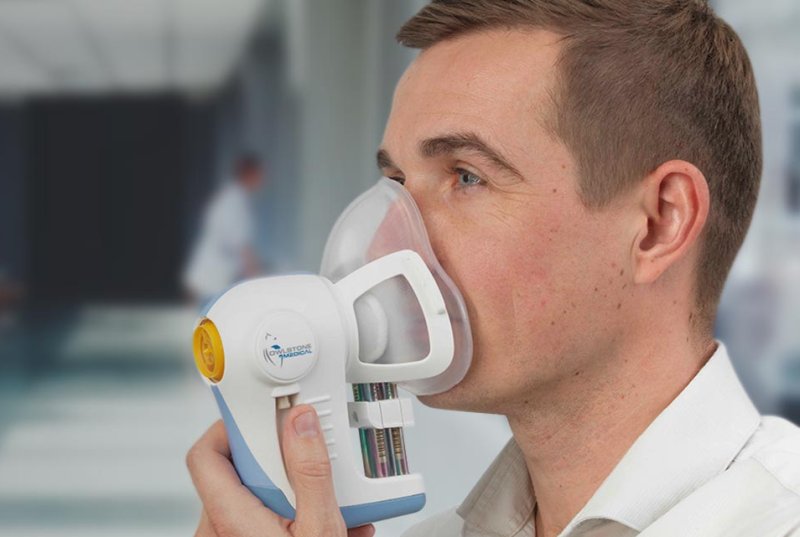A person uses the Breath Biopsy ReCIVA Breath Sampler, a device currently undergoing clinical trial in the U.K. for detection of cancer. Photo courtesy of Owlstone Medical
Jan. 3 (UPI) -- Development of a breath test that can discover multiple types of cancers is currently underway.
Clinical trials for the Breath Biopsy technology will collect breath samples from 1,500 people in search of odorous molecules known as volatile organic compounds, or VOCs. The rearrangement of these compounds into certain patterns can indicate the presence of some cancer types.
Past research has shown that a human's breath contains carbon dioxide, nitrogen and oxygen, as well as more than 100 chemical compounds, some of which form cancerous patterns.
The Cancer Research UK Cambridge Center, in conjunction with Owlstone Medical, hope the Breath Biopsy technology will help identify these cancerous patterns.
"We urgently need to develop new tools, like this breath test, which could help to detect and diagnose cancer earlier, giving patients the best chance of surviving their disease," Rebecca Fitzgerald, lead trial investigator at the Cancer Research UK Cambridge Center, said in a news release. "Through this clinical trial we hope to find signatures in breath needed to detect cancers earlier - it's the crucial next step in developing this technology. Owlstone Medical's Breath Biopsy technology is the first to test across multiple cancer types, potentially paving the way for a universal breath test."
The trial will begin by testing people with suspected esophageal and stomach cancers, then broaden to bladder, kidney, liver, prostate and pancreatic cancers in future months.
In England, many cancers, like esophageal are diagnosed at a late stage. According to Cancer Research Center UK, only 12 percent of esophageal cancer patients survive beyond 10 years.
In 2017, clinical trials of a breath test showed 85 percent accuracy in detecting esophageal cancer. The year before, another device was reportedly able to sense prostate cancer in men using a gas chromatography sensor system to "smell" the disease.
"There is increasing potential for breath-based tests to aid diagnosis, sitting alongside blood and urine tests in an effort to help doctors detect and treat disease," Billy Boyle, co-founder and CEO at Owlstone Medical, said in a press release. "The concept of providing a whole-body snapshot in a completely non-invasive way is very powerful and could reduce harm by sparing patients from more invasive tests that they don't need."
The researchers of this latest trial hope successful trials of the technology could lead to its use by general practitioners as a preliminary test for further diagnostic cancer tests.
"Early detection research has faced an historic lack of funding and industry interest, and this work is a shining example of Cancer Research UK's commitment to reverse that trend and drive vital progress in shifting cancer diagnosis towards earlier stages," said David Crosby, head of early detection research at Cancer Research UK.















